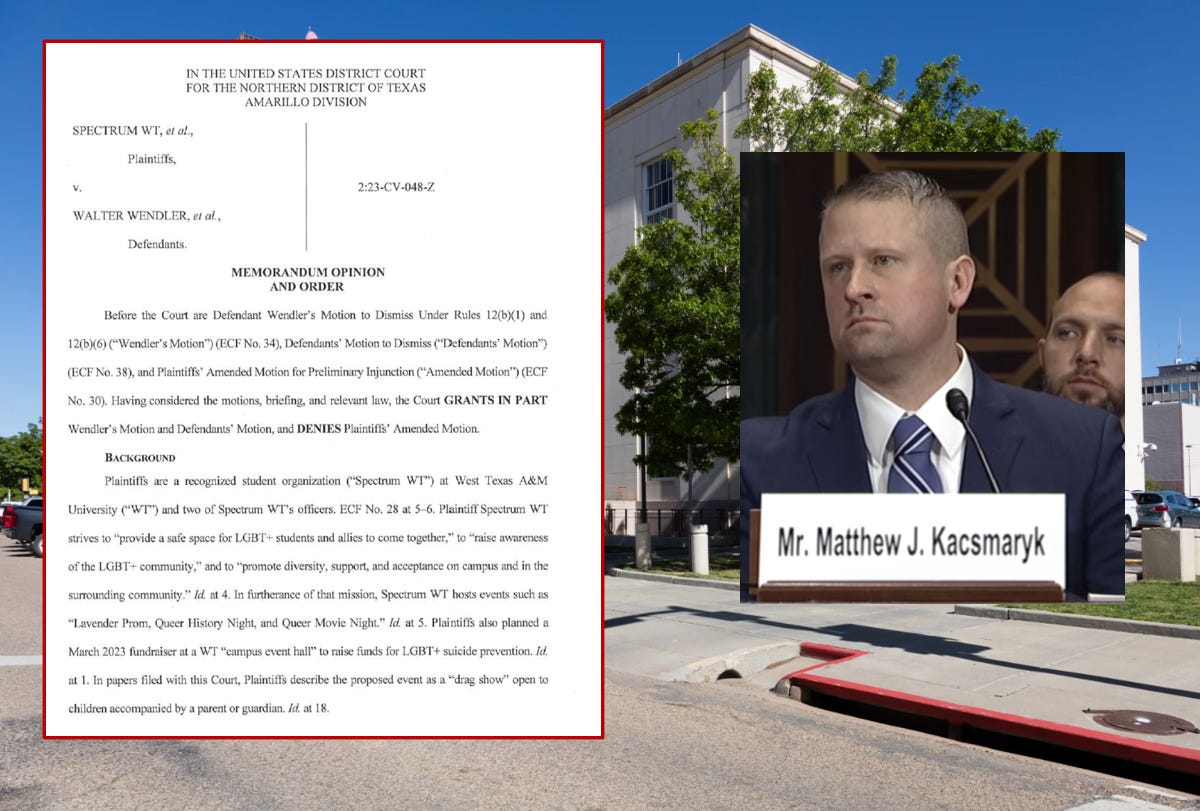Rating: Trans supportive neutral phobic, Erin In The Morning, September 22, 2023 (PDF archive) (HTML archive) (Take Action)
Action Recommendations
- Suggest/Improve an Action on the GenderMenace.net Action Portal!
Content Summary
Texas Anti-Abortion Judge Suggests Drag Is “Sexualized,” Allows Ban
An infamous federal judge in Texas, Judge Matthew Kacsmaryk, ruled today that a ban on drag shows at West Texas A&M does not violate the free speech rights of WT Spectrum, a group of LGBTQ+ students and allies, who had planned to put on a drag show for charity on the university campus. Kacsmaryk’s verdict stands in stark contrast to rulings in states like Tennessee, Montana, Florida, and even another in Texas, where drag bans have been deemed unconstitutional. The judge’s track record includes contentious decisions such as upholding a ban on the abortion drug mifepristone, obstructing teens’ access to birth control, and halting Biden’s asylum policy in favor of Trump’s “remain in Mexico” stance. The ruling cited infamous anti-LGBTQ+ figures, such as Chris Rufo and Gays Against Groomers, to justify calling drag “sexual.” Given this latest judgment, the future of drag events at West Texas A&M hangs in the balance.
The case in question revolves around a drag event that LGBTQ+ students and allies had planned at West Texas A&M. Intended to take place on campus, this show was organized to support the Trevor Project, aiming to prevent LGBTQ+ suicides. However, the trajectory changed abruptly when University President Walter Wendler released a letter. In it, he stated, “drag shows are derisive, divisive, and demoralizing misogyny, no matter the intent,” grounding his opposition in his religious beliefs: “I believe every human being is created in the image of God and, therefore, a person of dignity.” He concluded by asserting that no drag show would be allowed, even if mandated by law: “A harmless drag show? Not possible. I will not appear to condone the diminishment of any group at the expense of impertinent gestures toward another group for any reason, even when the law of the land appears to require it.”
Students took legal action, advocating for the show’s continuation. Concurrently, legal challenges to drag bans were cropping up across the U.S., with many such laws being overturned. In Tennessee, for instance, a federal judge struck down a drag ban on the grounds of excessive vagueness and content-based restrictions, which conflict with First Amendment rights. Similarly, a Montana federal judge intervened against a drag ban that put a Pride parade in jeopardy, noting that the prohibition “disproportionately harms any person falling outside of traditional gender and identity norms.” Similar cases were ruled similarly in Florida and also by another federal judge in Texas. This particular case fell to Judge Kacsmaryk, who declined to issue an immediate restraining order against the university’s ban, leading to the cancellation of the 2023 event. Now on Friday, Judge Kacsmaryk has ruled that drag bans can go forward on college campuses, and in doing so placed him severely out of step with other judicial rulings on the topic.
The 26-page ruling throws out all precedent when it comes to drag and instead declares that drag is “sexualized” and therefore can be subject to many restrictions. In explaining why drag bans can go forward, he writes that an “important outer limit” to expressive conduct is “sexualized expressive conduct” and that “when children are involved, the calculation changes.” Thus, Judge Kacsymark appears to rule that drag is inherently sexual and thus can be restricted in public spaces. When faced with many other court precedents over drag, such as on one college where a college fraternity was allowed to hold an “ugly woman contest” where fraternity brothers dressed in drag, Kacsymark rules that such a contest is allowed because it is “an exercise of teenage campus excess” with “an obvious sophomoric nature,” and that “the message conveyed” ran “counter to the views” of the university on racial integration and gender neutrality.
The judge then explains that a drag event put on by a LGBTQ+ club, however, is not constitutionally protected free speech. He rectifies the differences, in part, by stating that drag cannot be clearly interpreted as connected with LGBTQ+ topics. The source he uses to make this claim? The anti-trans group, “Gays Against Groomers,” an extremist group that has propagated the “groomer” slur against trans people and has previously organized with groups responsible for Don’t Say Gay laws, such as Moms For Liberty.
The Judge goes on to make broader claims about allowing people to dress not in accordance with their assigned sex at birth. He states that “apparel and attire” is not constitutionally protected expression, citing a 7th Circuit ruling. He proceeds to cite other cases n the footnotes, including Star v Gramley, a 1996 case stating that an inmate has “no clearly established right to cross-dress.”
In his assessment that drag events are sexual in nature, the judge references Chris Rufo, a well known anti-transgender activist. The Anti-Defamation League has stated Rufo played a large part in the early spread of “grooming” allegations directed at LGBTQ+ people. Based on this reasoning, the judge concludes that drag is potentially subject to restrictions and does not fall under constitutionally protected free speech. Consequently, he denies the temporary restraining order.
Judge Kacsmaryk has been involved in several other highly contentious cases where his rulings have made national headlines. Earlier this year, the judge released a highly controversial ruling that blocked the US FDA’s approval of mifepristone, the medication abortion drug. In his ruling, he compared abortion to eugenics. He was also involved in a recent decision ending Biden’s asylum program in favor of Trump’s “remain in Mexico” policy. The far-right judge, nominated by Trump, has repeatedly led to charges of judge shopping due to the overwhelming number of key cases that are brought before him.
This decision is not the ultimate judgment on the matter, and a final verdict regarding whether drag constitutes protected speech is still months away. Given Judge Kacsmaryk’s past rulings, there’s limited hope he will reconsider his stance. The plaintiffs could escalate their appeal to the 5th Circuit Court eventually, a court that has shown a similar lack of favor towards LGBTQ+ issues. If Judge Kacsmaryk’s stance persists, attention will shift to the that court. A divergence in rulings on this subject may well pave the way for yet another LGBTQ+ issue to reach the Supreme Court in the future.


Leave a Reply